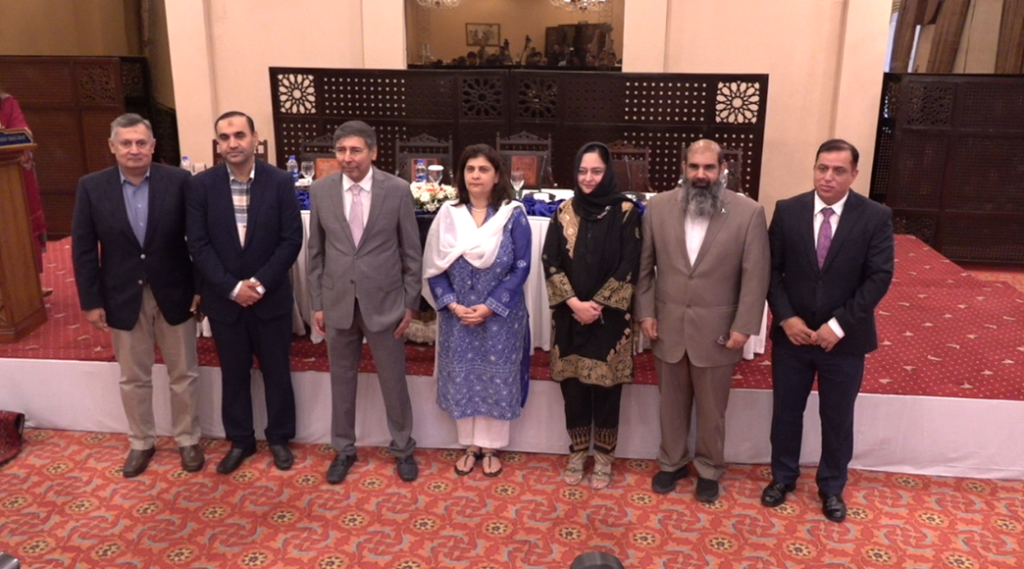Islamabad: Federal Minister for Planning, Development, and Special Initiatives, Ahsan Iqbal, emphasized the government’s commitment to digital transformation while addressing the “Empowering Digital Pakistan” conference organized by the Institute of Regional Studies (IRS) and the Center of Pakistan and International Relations (COPAIR).
He stated that the government is working with all stakeholders to bring about a digital revolution in Pakistan, highlighting the need for cooperation and collaboration as the only path to prosperity.
He also acknowledged the immense potential of the country, particularly its youth, to propel Pakistan forward through digitalization.
However, he stressed that this can only be achieved by connecting the younger generation with rapidly evolving technologies.
The Planning Minister underscored the importance of peace, political stability, policy continuity, and a commitment to reforms to set the country on the path of economic development.
He noted that Pakistan is at a critical juncture and cannot afford to lag behind in adopting the latest technologies. He emphasized the need for introducing technology across all sectors to compete globally, urging mutual cooperation and collective efforts to steer the country in the right direction.
Speaking at the event, IRS President Ambassador Johar Saleem highlighted the importance of aligning policies and institutions with modern technology to accelerate digital transformation in the country.
He pointed out the existing digital divide, with certain sectors of the economy and society benefiting significantly from digital advancements while others are falling behind.
He stressed the need to digitize e-governance and public services, while also promoting digital awareness and adopting best practices.
He asserted that Pakistan can only catch up with other highly developed economies through rapid digital transformation.
Ms. Amna Manoor Awan, President of COPAIR, discussed the potential of emerging technologies to revolutionize industries, enhance decision-making processes, and create new economic opportunities.
To meet these challenges and fully leverage emerging technologies, she called for a united effort in areas such as artificial intelligence (AI), blockchain, open-source intelligence (OSINT), quantum computing, cybersecurity, digital media literacy, infrastructure development, and education.
She urged the need to digitally empower everyone and transform Pakistan into a hub of innovation and growth.
Ms. Ayesha Humira Chaudhary, Additional Secretary at the Ministry of IT and Telecom, briefed the participants on the ministry’s efforts to advance the country’s IT infrastructure.
She also emphasized the importance of promoting digital transformation through collaboration with both domestic and international companies.
Dr. Babar Majid Bhatti, CEO of NATB, highlighted the significance of adopting digital technologies to achieve overall socio-economic development.
He stressed the need to address the overlapping initiatives and projects in the country that are not effectively contributing to digitalization.
National CERT Director General, Dr. Haider Abbas, revealed that Pakistan ranks as one of the most insecure countries in terms of cybersecurity, according to global and national cybersecurity indices.
He mentioned that the Pakistan Cyber Emergency Response Team has implemented various measures to protect the country’s digital borders and is collaborating with key stakeholders to enhance digital security resilience.
Pasha Vice Chairman, Khurram Rahat, recommended the establishment of a robust framework for digital transformation and cybersecurity.
He also emphasized the need for strict implementation of a legal framework and an open data policy to promote data monetization and increase public access.
Mr. Aamir Shehzad, Director General of Wireless at PTA, outlined the strategic framework adopted by the PTA to drive digitalization, reiterating the authority’s commitment to infrastructure development.
In the concluding session, National Vocational and Technical Training Commission (NAVTTC) Chairperson, Ms. Gulmina Bilal Ahmed, emphasized the organization’s collaboration with industry, international organizations, and government agencies to tailor its programs to meet market needs.
She added that NAVTTC is offering cutting-edge IT courses to thousands of students through its extensive network of training centers across the country, utilizing digital tools and platforms.
The seminar, held at Serena Hotel, attracted a diverse audience, including foreign ambassadors and diplomats, CEOs of IT companies, heads of think tanks, former ambassadors, academic institutions, intellectuals, and opinion leaders.


